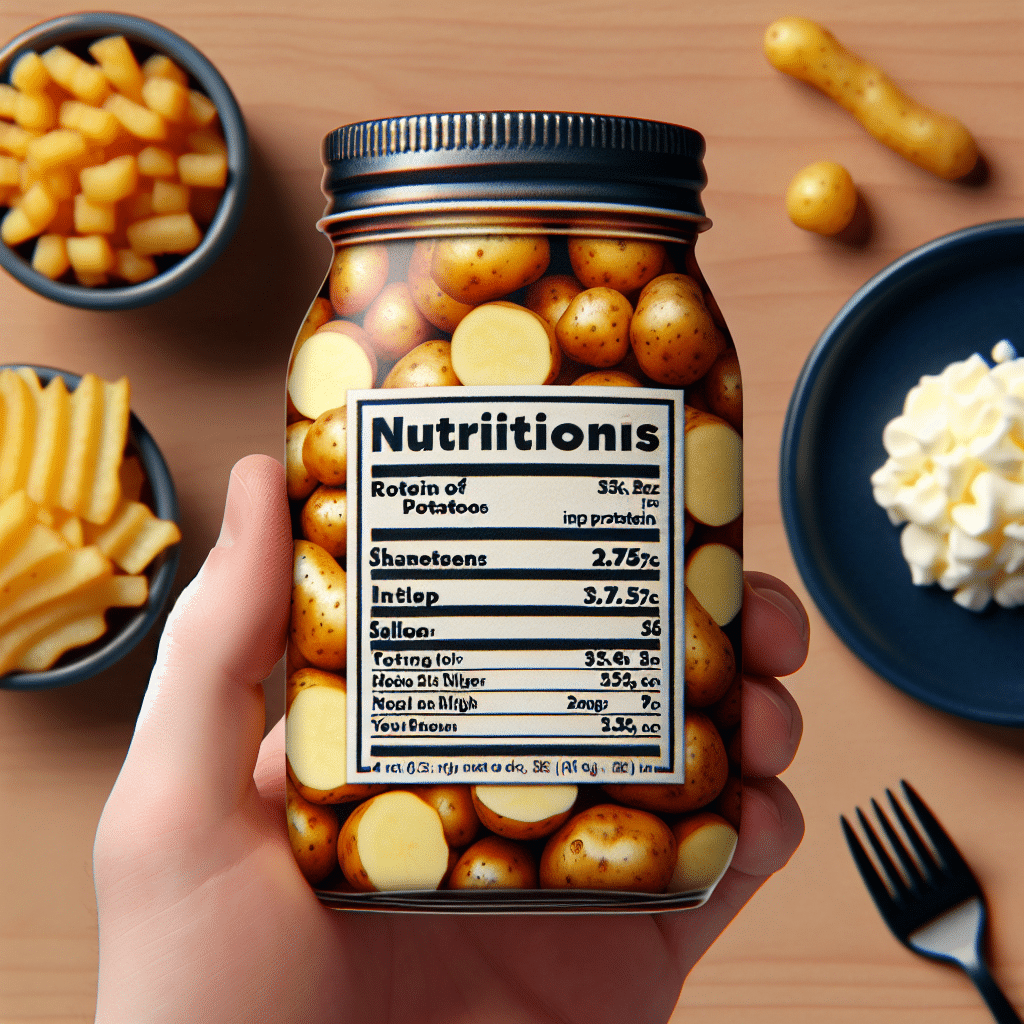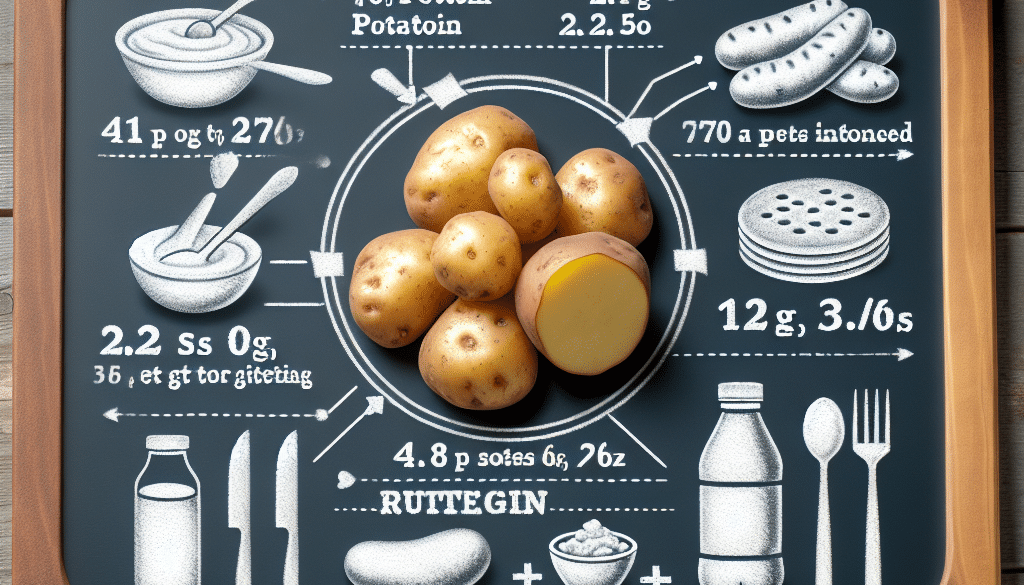How Much Protein Is In 4 Oz Of Potatoes?
-
Table of Contents
- Protein Content in 4 Oz of Potatoes: A Nutritional Insight
- Nutritional Breakdown of Potatoes
- Protein Content in Potatoes
- Other Nutritional Components
- Comparing Protein Content with Other Foods
- Role of Potatoes in a Balanced Diet
- Impact of Cooking Methods on Protein
- Best Practices for Cooking Potatoes
- Incorporating Potatoes into a High-Protein Diet
- Conclusion: Understanding Potato Protein Content
- Discover ETprotein’s High-Quality Protein Products
Protein Content in 4 Oz of Potatoes: A Nutritional Insight

When it comes to understanding the nutritional value of foods, protein content is often a key factor for many individuals, especially those who are health-conscious or looking to maintain a balanced diet. Potatoes, a staple food in many cultures, are widely recognized for their carbohydrate content, but their protein content is not as commonly discussed. In this article, we will delve into the specifics of how much protein is found in 4 ounces of potatoes and explore the broader nutritional profile of this versatile tuber.
Nutritional Breakdown of Potatoes
Potatoes are primarily known for their carbohydrate content, which provides a quick source of energy. However, they also contain a variety of other nutrients, including protein, fiber, vitamins, and minerals. To understand the protein content in potatoes, it’s important to look at their overall nutritional makeup.
Protein Content in Potatoes
When measuring the protein content in potatoes, it’s essential to consider the type of potato and how it’s prepared. On average, a 4-ounce serving of raw potatoes contains about 2 grams of protein. This amount can vary slightly depending on the specific variety of potato and its size.
Other Nutritional Components
- Carbohydrates: Potatoes are a good source of complex carbohydrates, which are important for sustained energy.
- Fiber: With the skin on, potatoes provide dietary fiber that aids in digestion and promotes a feeling of fullness.
- Vitamins and Minerals: Potatoes are rich in vitamin C, vitamin B6, potassium, and other essential nutrients.
- Antioxidants: They also contain antioxidants like flavonoids, carotenoids, and phenolic acids.
Comparing Protein Content with Other Foods
While potatoes do contain protein, they are not as protein-dense as other foods. For example, a 4-ounce serving of chicken breast could provide about 26 grams of protein, which is significantly higher than the protein content in potatoes. Legumes, nuts, and dairy products are also higher in protein compared to potatoes.
Role of Potatoes in a Balanced Diet
Despite their lower protein content, potatoes can still play a valuable role in a balanced diet. They can serve as a source of energy due to their carbohydrate content and provide essential nutrients that support overall health. When combined with other protein-rich foods, potatoes can help create a well-rounded meal.
Impact of Cooking Methods on Protein
The way potatoes are prepared can affect their nutritional value, including their protein content. Boiling, baking, and steaming are cooking methods that preserve most of the protein in potatoes. However, frying potatoes can add extra calories and unhealthy fats, which may detract from their nutritional benefits.
Best Practices for Cooking Potatoes
- Opt for baking or boiling instead of frying to maintain nutritional value.
- Keep the skin on to maximize fiber intake.
- Avoid adding excessive amounts of unhealthy toppings like butter or sour cream.
Incorporating Potatoes into a High-Protein Diet
For those looking to increase their protein intake, potatoes can complement other protein sources. Here are some ideas for incorporating potatoes into a high-protein diet:
- Pairing a baked potato with a serving of Greek yogurt or cottage cheese.
- Adding diced potatoes to a frittata or omelet with eggs, which are high in protein.
- Combining boiled potatoes with legumes or lean meats in salads or stews.
Conclusion: Understanding Potato Protein Content
In conclusion, while potatoes are not a high-protein food, they do contain about 2 grams of protein per 4 ounces. They are a nutritious option that can be part of a balanced diet when consumed in moderation and combined with other protein sources. By understanding the protein content and nutritional value of potatoes, individuals can make informed choices about their dietary intake and enjoy the benefits of this versatile vegetable.
Discover ETprotein’s High-Quality Protein Products
If you’re looking to supplement your diet with additional protein, ETprotein offers a range of organic bulk vegan proteins that can meet your needs. Their products, including rice protein, pea protein, and various seed proteins, are characterized by a neutral taste, non-GMO, and allergen-free attributes. With L-(+)-Ergothioneine purity over 98%, ETprotein caters to industries such as nutraceuticals, pharmaceuticals, and food and beverage. Enhance your diet with ETprotein’s high-quality protein products for optimal health and wellness.
About ETprotein:
ETprotein, a reputable protein and L-(+)-Ergothioneine (EGT) Chinese factory manufacturer and supplier, is renowned for producing, stocking, exporting, and delivering the highest quality organic bulk vegan proteins and L-(+)-Ergothioneine. They include Organic rice protein, clear rice protein, pea protein, clear pea protein, watermelon seed protein, pumpkin seed protein, sunflower seed protein, mung bean protein, peanut protein, and L-(+)-Ergothioneine EGT Pharmaceutical grade, L-(+)-Ergothioneine EGT food grade, L-(+)-Ergothioneine EGT cosmetic grade, L-(+)-Ergothioneine EGT reference grade and L-(+)-Ergothioneine EGT standard. Their offerings, characterized by a neutral taste, non-GMO, allergen-free attributes, with L-(+)-Ergothioneine purity over 98%, 99%, cater to a diverse range of industries. They serve nutraceutical, pharmaceutical, cosmeceutical, veterinary, as well as food and beverage finished product distributors, traders, and manufacturers across Europe, USA, Canada, Australia, Thailand, Japan, Korea, Brazil, and Chile, among others.
ETprotein specialization includes exporting and delivering tailor-made protein powder and finished nutritional supplements. Their extensive product range covers sectors like Food and Beverage, Sports Nutrition, Weight Management, Dietary Supplements, Health and Wellness Products, and Infant Formula, ensuring comprehensive solutions to meet all your protein needs.
As a trusted company by leading global food and beverage brands and Fortune 500 companies, ETprotein reinforces China’s reputation in the global arena. For more information or to sample their products, please contact them and email sales(at)ETprotein.com today.














